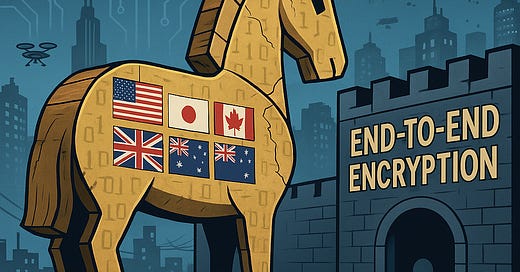On 11 October 2020, a coalition of governments led by major Western powers issued an International Statement on End-to-End Encryption and Public Safety. At first glance, it reads like a balanced attempt to reconcile privacy and national security. In reality, it’s a diplomatically worded attempt to undermine strong encryption — dressed up as a plea for “lawful access.”
The statement was jointly signed by Australia, Canada, India, Japan, New Zealand, the United Kingdom, and the United States. These aren’t random names on a list — five are part of the Five Eyes intelligence alliance, and the others are close strategic partners. Their unified position represents a coordinated effort by powerful states to reshape the global narrative on encryption.
The Premise
The declaration opens with a nod to the benefits of encryption: protection of personal data, intellectual property, and freedom of expression. It even acknowledges the role of encryption in safeguarding journalists, activists, and human rights defenders, particularly under authoritarian regimes.
In reality, it’s a diplomatically worded attempt to undermine strong encryption — dressed up as a plea for “lawful access.”
However, it quickly shifts to a familiar cry: encryption makes it harder for law enforcement to combat serious crimes — including terrorism, child exploitation, and violent extremism. The solution, according to the signatories, is for technology companies to:
Embed public safety features into encrypted product design
Enable “lawful access” to content when deemed necessary and proportionate
Consult with governments early in the product development process
In other words, they want backdoors they just don’t want to call them that.
What It Really Means
“Lawful access” is a euphemism. It means building deliberate access mechanisms i.e., vulnerabilities, into encrypted systems. Whether it’s for child safety or counter-terrorism, the outcome is the same: if a system allows access to encrypted data, it is no longer secure by definition.
There’s no such thing as a secure system that includes selective access. It’s a binary state: either encryption works for everyone, or it works for no one.
Why This Is a Problem
1. Backdoors Break Security for Everyone
Encryption protects everything from financial data to government secrets. The same lock that stops a cybercriminal also keeps out spies, scammers, and foreign intelligence services. Introducing a backdoor means introducing a universal vulnerability.
2. No Free Speech
When people know their conversations might be accessed, they hold back. That self-censorship silences whistleblowers, dissidents, and anyone who challenges the status quo. Encryption isn't just about secrecy — it's about freedom of thought and expression.
3. Surveillance Creep
Governments have a poor track record of staying within their original mandates. Anti-terror tools quickly get repurposed for tax enforcement, minor drug offences, or political opposition. Once the surveillance infrastructure exists, mission creep is inevitable.
4. It’s Technically Unworkable
There is no “safe” way to build a backdoor into encryption. The world’s best cryptographers have said this repeatedly. A “good guy only” access mechanism is a myth — once the vulnerability exists, it’s exploitable by anyone who finds it, and nation-states will certainly try.
5. Empowers Authoritarian Regimes
When liberal democracies adopt surveillance-friendly policies, authoritarian states follow suit, without the safeguards. This statement becomes an international permission slip for regimes that already trample civil liberties. If the U.S., UK, and Japan weaken encryption, you can bet others will go further, faster, and with less restraint.
What’s Really Going On?
This is purely about control, it’s got nothing to do with stopping crime. Governments are uncomfortable with communication channels they can’t monitor. Encryption is one of the last bastions of true privacy and they want a key. They’re just hoping you’ll be too distracted by the word “safety” to notice the lock being picked.
The Bottom Line
This “public safety” statement is a Trojan horse. It makes surveillance sound like security and treats privacy as a problem rather than a right. It invites governments into your digital life while pretending to keep your secrets safe.
Let’s be clear: encryption must be absolute, or it’s worthless. There is no middle ground. Tech companies, civil society, and privacy advocates must resist these initiatives. Because once you open a backdoor there’s no closing it again.






My name is Toshi, and I am a member of JCA-NET, a Japanese communication rights movement organization. Thank you for your interest in the 2020 statement by the 5eyes and others. At the time, JCA-NET issued the following counter-statement in opposition to this statement.
Against Crypto Regulations - Government of Japan should withdraw from the “International Statement: End-To-End Encryption and Public Safety”!
https://www.jca.apc.org/jca-net/ja/node/124
There is a detailed explanation on our Japanese website.
https://www.jca.apc.org/jca-net/ja/node/104
This statement, which aims to undermine the encryption of the government side, has since been joined by an increasing number of countries. Singapore, Georgia, Ecuador and Jordan have subsequently joined.
The website of the Japanese Ministry of Foreign Affairs
https://www.mofa.go.jp/mofaj/la_c/sa/co/page22_003432.html